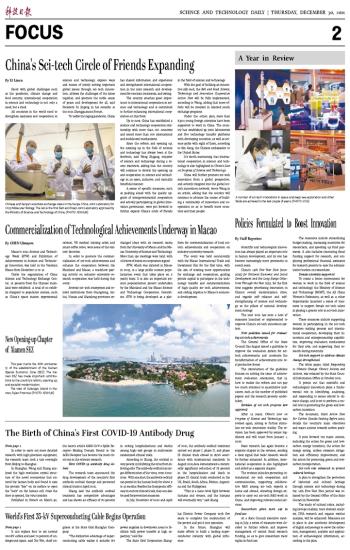
 |
| Chinese and Kenyan scientists exchange views in the Kenya-China Joint Laboratory for Crop Molecular Biology. The lab is the first Belt and Road Joint Laboratory approved by the Ministry of Science and Technology of China. (PHOTO: XINHUA) |
Faced with global challenges such as the pandemic, climate change and food security, international cooperation in science and technology is not only a need, but a must.
All countries in the world need to strengthen openness and cooperation in science and technology, explore ways and means of jointly solving important global issues through sci-tech innovation, address the challenges of the times together, and promote the noble cause of peace and development for all, said President Xi Jinping in his remarks at the 2021 Zhongguancun Forum.
To tackle the raging pandemic, China has shared information and experience and strengthened international cooperation in the joint research and development for vaccines, treatments, and testing.
The country attaches great importance to international cooperation in science and technology and is committed to further enhancing international cooperation on this front.
Up to now, China has established a science and technology cooperation relationship with more than 160 countries and joined more than 200 international and multilateral mechanisms.
Since the reform and opening up, the opening up in the field of science and technology has always been at the forefront, said Wang Zhigang, minister of science and technology during a recent interview, adding that the country will continue to elevate the opening up and cooperation in science and technology in an open, inclusive, and mutually beneficial manner.
A series of specific measures, such as pushing ahead with the quality upgrade of intergovernmental cooperation and actively participating in global innovation governance, were put forward to further expand China's circle of friends in the field of science and technology.
With the goal of building an innovative silk road, the Belt and Road Science, Technology and Innovation Cooperation Action Plan will be fully implemented, according to Wang, adding that more efforts will be invested in talented youth exchange programs.
Under the action plan, more than 8,300 young foreign scientists have been supported to work in China. The country has established 33 joint laboratories and five technology transfer platforms with developing countries, as well as science parks with eight of them, according to Qin Gang, the Chinese ambassador to the United States.
It's worth mentioning that international cooperation in science and technology is also highlighted in China's Law on Progress of Science and Technology.
China will further promote sci-tech innovation from a global perspective, and actively integrate into the global sci-tech innovation network, wrote Wang in an article, adding that the country will continue to advance the course of building a community of innovation and cooperation so as to benefit more countries and their people.


 Next
Next




